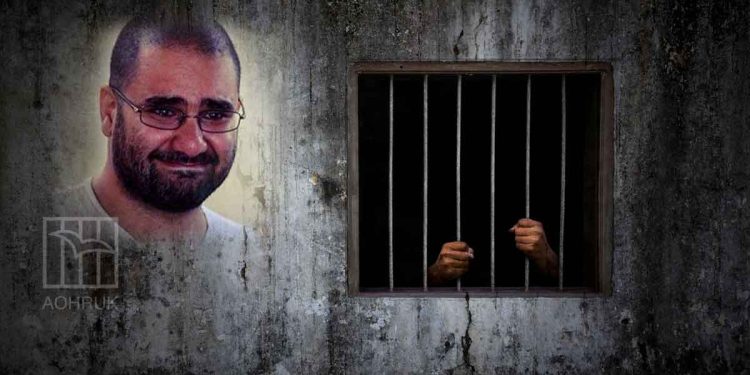The family of detained Egyptian activist Alaa Abdel Fattah confirmed that he has escalated his 5 months long hunger strike, in protest against his ongoing detention and reducing his meals.
His sister, Sanaa Seif, made a media statement saying that Alaa used to eat one piece of fibre food per week (either apple or cucumber), in addition to drinking only 100 calories of liquids to stay alive, however, he decided to stop eating his daily food.
On her visit to Alaa on Tuesday, Alaa was very weak that he was only able to stand up while leaning on the glass partition.
She added, “He asked us to stop bringing any liquids or vitamins during visits because he would only use what he has stored in preparation for entering into a full hunger strike soon.”
Furthermore, Alaa assured his sister that individual requests are not possible, and therefore he amended his demands to “releasing all detainees inside the National Security headquarters, releasing all those who have finished the pre-trial detention period, which is 18 months for misdemeanours cases and 24 months for felony cases, and releasing all those who have been sentenced under unconstitutional litigation procedures (according to the new constitution), such as imprisonment in publishing cases and emergency state security courts and granting an amnesty for one-third of those imprisoned in cases with no victims.
His mother, Laila Soueif, had previously expressed her concern over her son’s rapid health deterioration.
Alaa’s sister, who holds British citizenship, denounced the lack of action by governments and politicians on her detained brother’s case, as she had raised Alaa’s case with many people, including members of the British Parliament and officials of the British Foreign Office, and the response every time is that Britain is excreting pressure in order to obtain a counsellor visit.
A spokesman for the British Foreign and Commonwealth Office said: “We are making every effort to secure the release of Mr. Abdel Fattah and urge the Egyptian authorities to ensure that his subsistence needs are met.”
A British government official confirmed that Prime Minister Boris Johnson raised the issue directly with Egyptian President Abdel Fattah Al-Sisi in a recent phone conversation.
Alaa Abdel Fattah, one of the most prominent activists of the January 2011 revolution, was arrested in 2013 and stayed in prison for 5 years since 2014, after being convicted of “gathering and participating in an unauthorised protest.”
In late 2019, Alaa was re-arrested months after his release after serving the sentence in the first case, and in December 2021, he was sentenced to another five years in prison on charges of “joining a terrorist group and spreading false news”. These charges are known to be directed by the Egyptian regime against its critics to facilitate their arrest and prosecution.






























